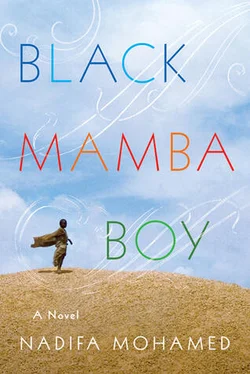Jama was woken on his last morning by the clatter of pots and pans crashing to the floor. Talyani’s voice rang through the house as he shouted at Zainab in the kitchen.
“Didn’t your mother teach you anything, you idiot! Pick these things up, I didn’t buy them for you to destroy.”
Jama covered his ears to block out Talyani’s viciousness and chased after his sweet dreams. Talyani’s boots approached. “Are you ready? I have places to go,” he said. Jama slunk out of the covers and went to the basin, the water washing away the last vestiges of his dreaminess.
They waited outside while Talyani secured two large locks on the front door. Marco kicked his legs out from his mother’s hip and gurgled with excitement at feeling fresh air on his skin. Zainab squinted up at the cerulean sky. Her red clothes made her look young and free, but she held on tightly to her son. Jama could not imagine Zainab growing old in this town.
Assab was buffeted by hot, dry winds blowing in from the volcanic black deserts of Dankalia. Maybe Assab was too close to that apocalyptic waste for the Italians to make much effort, despite it being their first imperial foothold since the Caesars. They had bought Assab for a moderate sum from the Egyptians. Its buildings were ancient and crumbling, stained gray and deformed by the unrelenting wind. The people were a ragbag of wanderers: Abyssinians looking for work, Yemeni fishermen following the shoals of the Red Sea, nomadic Afars with their teeth filed into points, Somalis on their way to somewhere else. Although it was a busy port like Djibouti Town, most people slept long into the day, and those up and about had a pinched, frustrated look on their faces, angry at missing the epoch when this area was one of the richest on earth. As part of the Axumite Empire, Assab, many centuries ago, had exported rhino horn, hippo hides, apes, and lions to Rome, Egypt, and Persia.
A cargo boat swayed to the side of them, its paint shedding swaths of metallic leaves. It was the only vessel moored and it seemed to have come in to die, heaving and sighing as heavily as it was. Talyani stopped and handed Jama his flimsy two-lire ticket, his pass to his father.
“The journey will take about half a day. I will find someone to escort you to Asmara. Wait until you see that place, wah wah!” he explained, eyes blazing. “The Italians have turned it into one big paradise; there are picture houses, hotels, shops that sell whatever you could want to buy.” Talyani left to find Jama an escort for the rest of the journey. He returned quickly with two other askaris, young men with smooth skin.
“These boys can accompany you some of the way, they are going to their new barracks in Asmara,” said Talyani, proudly tapping them on the back. “This little boy is going to Sudan, his father is working there. Must be in Gedaref, many Issa have gone there to work for the British. There is a train from Asmara to Agordat, and then a bus will take you over the border into Sudan. The roads are fantastic now, the Ferengis have brought progress to this country at last.”
Talyani shook Jama’s hand, nearly crushing it. “Maybe you will become an askari, like your father and me.”
“My father is a driver, not an askari,” corrected Jama, put off them by Talyani’s example.
Zainab shook Jama’s hand, and he boarded his second ship. Talyani marched on ahead and Zainab reluctantly followed, turning back to wave intermittently, her sad smile bright in the morning light.
Underneath his feet Jama could hear the bleating of sheep and their hooves jittering on wooden planks. He crouched down away from the hot wind and peeped through the cracks in the wood. He could make out bony noses and fluffy bodies in the shafts of light cutting through the hold, and an oily scent drifted up in the heat. The young askaris climbed the gangplank, their heavy slow steps belying their age. Look at all those hot clothes, thought Jama, and he felt faint just looking at them. The ship slipped its mooring quickly and with little warning, leaving behind hollering stragglers who raced along the quay to catch up with it, holding their sarongs up between their legs. “Masaakiin, poor men,” muttered Jama as he watched them desperately gesticulate to the laughing crew. Jama stretched out on his stomach, sea spray cascading over his back, and tried to pursue that morning’s lost sleep.
The shriek of seagulls made Jama sit up, he was surrounded by families eating lunch, and he wiped the drool from his cheek. Ahead of him lay mountains and hills higher than he had ever seen, reaching beyond the clouds. Underneath the Eritrean mountains nestled a pretty whitewashed town, its jetty reaching welcomingly out into the sea. As Massawa got closer, Jama could see an island of elegant arches and stuccoed white palaces looming over another island crammed with shantytowns of corrugated sheets and wooden planks. The rich town and poor town were tied together by a concrete umbilical cord. A sign faced out to sea, and one of the askaris leaned forward, trying to pick out the words on the salt-scoured board. “The pearl of the Red Sea,” he recited slowly. Jama smiled at the glamour the sign promised. Dhows plied the placid sea and birds fluttered, pecking at snails on the mud flats surrounding the causeway. They entered a maze of streets, the askaris leading the way, through dark mysterious alleys that suddenly opened up into light-filled squares and then led back into darkness. Jama looked up. Some of the houses had wooden shutters and intricately carved balconies, and one had a mammoth, onion-shaped dome sitting squat on its roof. Ancient mosques, their walls uneven with repeated whitewashing, stood separate from the homes, like dignified grandparents sitting on the street watching the world go by. The silver cross of the Orthodox Church shone a supernatural white on the skyline, behind the star and crescent of a mosque. Jama let out a happy sigh at the covered market bedecked with bright awnings over the stalls, goods neatly laid out on tables like booty recovered from Aladdin’s cave. Despite its antiquity, Massawa was tidy and well kept, with pockets of incredible wealth hidden like teeth in an infant’s gums. Servants piled in and out of the grand homes of Armenian, Arab, Jewish, and European merchants. Everywhere there was the sound of quiet and profitable industry. And yet, nearby lay shantytowns where sparsely filled cooking pans burned easily and Italians in shiny boots idled about in cheap bars, nursing glasses of beer.
They crossed a longer causeway into mainland Massawa. This part of town seemed plainer, more residential, where everyone went to rest after all the allurements of the old town.
“We’ll get a lorry along this main road,” said one of the askaris.
It didn’t seem like much of a main road to Jama, it was barely wide enough for one vehicle. Jama stared at the horizon. His father could just appear around the curve, it was more than possible that he drove up and down these roads, he thought. It wasn’t a busy road, and the sound of anyone approaching made Jama’s heart lurch. One of the askaris ran out into the road to flag down a lorry, and seeing the uniforms, the driver stopped. Jama quickly glanced up into the cab; “Not him,” he reassured himself, and they all piled in. The lorry left behind the vast depression in the earth that had begun in Djibouti, and creaked and screeched to manage the incline. The driver recited Al-Fatiha under his breath, while the askaris joked to hide their fear. The lorry nearly lost its balance as it clambered up, scraping its underside as it righted itself.
“It never gets easier,” said the driver through gritted teeth.
Jama, at first terrified by the precarious highway, began to enjoy it, calling out hazards. “Look! A pothole! And over there some loose rocks, be careful, driver!”
Читать дальше
Конец ознакомительного отрывка
Купить книгу












